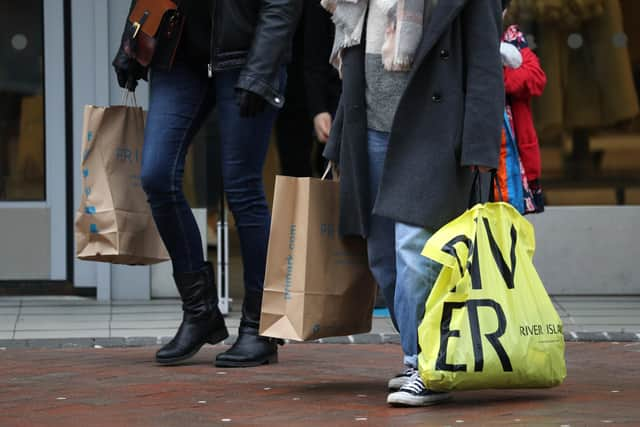Rain washed away retail sales during July, according to new ONS data
ONS figures concluded that retail sales volumes fell 1.2 per cent during the month as large numbers of consumers chose to spend more time shopping online.
Economists had expected a fall, but only by 0.5 per cent according to an average of different estimates provided by Pantheon Macroeconomics.
Advertisement
Hide AdAdvertisement
Hide AdThe ONS also said that June had been worse than first thought. Last month it said that June retail volumes rose 0.7 per cent, on Friday it revised this figure down to 0.6 per cent.


Despite a heatwave in Europe which was linked to climate change, the UK had its wettest July since 2009, and the sixth wettest July on record since 1836.
The wet weather and online promotions meant the proportion of sales made via the internet grew from 26 per cent in June to 27.4 per cent in July, the highest level since February 2022.
There was a 2.6 per cent fall in retail sales volumes at food shops.
Advertisement
Hide AdAdvertisement
Hide AdMuch of this was due to a fall in clothes sales at supermarkets which was linked to the bad weather.
ONS deputy director for surveys and economic indicators Heather Bovill said: “Retail sales fell sharply in July as poor weather impacted most sectors.
“It was a particularly bad month for supermarkets as the summer washout combined with the increased cost of living meant sluggish sales for both clothing and food.
“Department store and household goods sales also dropped significantly.
Advertisement
Hide AdAdvertisement
Hide Ad“The wet weather did mean a good month for online retailing, as discounting plus consumers shopping from the comfort of their homes boosted sales.”
The amount that shoppers spent also fell, but at the slightly slower rate of 1 per cent.
Martin Beck, chief economic advisor to the EY Item Club, said: “With sales in July well below the second quarter average, there appears to be a good chance that sales volumes could fall in the current quarter.
“But while the EY Item Club doesn’t think July’s particular weakness is wholly indicative of the outlook for retail, given the weather factor, subdued growth is likely to characterise the sector for the foreseeable future. On the one hand, falling inflation and still-strong growth in cash pay mean average wages have finally started to rise again in real terms.
Advertisement
Hide AdAdvertisement
Hide AdHe added: “Meanwhile, the financial position of households, in aggregate, is relatively healthy, reflecting unplanned savings accumulated during the pandemic and a paying down of unsecured debt in recent years.
“But the impact of higher interest rates continues to build.
“An increasing number of households are reaching the end of fixed-rate deals and those re-mortgaging typically face a rise in monthly mortgage payments of several hundred pounds. And evidence of a cooling in the jobs market from rising unemployment and falling job vacancies mean that what has been a buttress to consumer spending is now looking less solid.”
AJ Bell investment director Russ Mould said: “The wet weather in July led to a drop in sales which was, markedly, twice as large as anticipated.
Advertisement
Hide AdAdvertisement
Hide Ad"The question is whether this is a one-off impact due to the rain or a sign the pressures on household budgets are finally starting to bite, to the extent logic would suggest they must, at some point.”